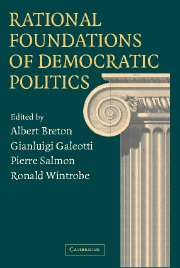Book contents
- Frontmatter
- Contents
- List of Contributors
- 1 Introduction
- PART ONE SOME PROBLEMS WITH DEMOCRATIC INSTITUTIONS AND TRENDS IN THEIR EVOLUTION
- PART TWO MORALS IN POLITICS
- PART THREE SOCIAL CAPITAL
- PART FOUR THE ROLE OF CONSTITUTIONS
- 10 Voting Rules: A Constitutional Quandary
- 11 Citizens' Sovereignty, Constitutional Commitments, and Renegotiation: Original versus Continuing Agreement
- 12 Constitutional Rules and Competitive Politics: Their Effects on Secessionism
- Index
- References
11 - Citizens' Sovereignty, Constitutional Commitments, and Renegotiation: Original versus Continuing Agreement
Published online by Cambridge University Press: 28 July 2009
- Frontmatter
- Contents
- List of Contributors
- 1 Introduction
- PART ONE SOME PROBLEMS WITH DEMOCRATIC INSTITUTIONS AND TRENDS IN THEIR EVOLUTION
- PART TWO MORALS IN POLITICS
- PART THREE SOCIAL CAPITAL
- PART FOUR THE ROLE OF CONSTITUTIONS
- 10 Voting Rules: A Constitutional Quandary
- 11 Citizens' Sovereignty, Constitutional Commitments, and Renegotiation: Original versus Continuing Agreement
- 12 Constitutional Rules and Competitive Politics: Their Effects on Secessionism
- Index
- References
Summary
INTRODUCTION
It is often argued that democratic polities, being founded on the principle of the sovereignty of the people, are inherently limited in their capacity to make binding commitments. Because a present parliament cannot effectively bind future parliaments, the argument goes, a commitment made at some point in time “in the name of the people” may be overturned by a parliament representing the respective constituency at a later time. In his “Distinguished Lecture on Economics in Government” the former chairman of the Council of Economic Advisors, Joseph Stiglitz, identifies this as a principal source of government failure when he notes: “The problem of commitment stems from the inherent nature of government itself. Government is the primary enforcer of contracts. It uses its monopoly on the legal use of force to create the possibility of private commitment. There is no one, however, whose job it is to guard the guardian. The government cannot make commitments because it always has the possibility of changing its mind, and earlier ‘agreements’ cannot be enforced.”
To be sure, to the argument that by contrast to private contracting parties within an established legal order the constituents of self-organized democratic polities have no external enforcing apparatus to which they could turn to give binding force to their commitments, one might respond that democratic politics operates at various levels (e.g. the level of local communes, of states or Länder within a federal union, of nation-states, up to the level of multinational arangements), andthat constituencies at any one level may choose to use an arrangement at the next higher level to give binding force to commitments that they wish to make.
- Type
- Chapter
- Information
- Rational Foundations of Democratic Politics , pp. 198 - 221Publisher: Cambridge University PressPrint publication year: 2003
References
- 1
- Cited by



